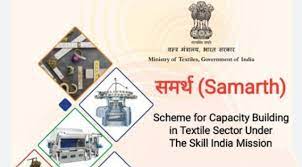43 new implementing partners empanelled under SAMARTH Scheme

43 new implementing partners empanelled under SAMARTH Scheme: According to the Textile Ministry, 43 new implementing partners have been appointed under SAMARTH initiatives, with a training objective of 75,000 beneficiaries and a 5% increase in support to implementing partners.
Daily Current Affairs Quiz: July 2023
What’s in News?
- The Empowered Committee for the Scheme for Capacity Building in the Textile Sector (SAMARTH) announced the addition of 43 new implementing partners, with an extra 75,000 beneficiaries being trained.
- The decision was taken with the motive to enhance the skill development of the workforce in the textile sector.
- Implementing partners will receive a 5% rise in order to provide financial support to industries engaging in skill development under the SAMARTH scheme.
- The Ministry of Textile has collaborated with 157 Textile Industries/Industry Associations, 16 Central/State Government Agencies, and 3 Ministry Sectoral Organisations to efficiently carry out training programmes through SAMARTH Schemes.
- The expansion of SAMARTH Scheme through the addition of implementing partners and increased training targets, signifies the government’s commitment to promote skill development and create employment opportunities in the textile sector.
About the SAMARTH Scheme:
The SAMARTH Scheme is a Textile Sector Capacity Building Scheme (SCBTS). SAMARTH is the Ministry of Textiles’ demand-driven and placement-oriented umbrella skilling programme. The scheme was formulated under the broad skilling policy framework. The Cabinet Committee on Economic Affairs launched the SAMARTH Scheme in 2017 under the Ministry of Textile. The SAMARTH Scheme focuses on the organised and traditional sectors.
Silent Features of SAMARTH Scheme:
- SAMARTH Scheme provides enhanced facility of skill development to the master trainers.
- Aadhar Enabled Biometric Attendance System (AEBAS): This maintains the authenticity of the trainers and beneficiaries.
- CCTV recording of training programmes: To avoid major conflicts in the functioning of the scheme, training institutes are fixed with CCTVs.
- Dedicated call centre with helpline number.
- Mobile app-based Management Information System (MIS).
- On-line monitoring of training processes.
Objective of the SAMARTH Scheme:
- It offers over 10 lakh people National Skills Framework Qualification (NSFQ)-compliant skilling programmes.
- The skilling programmes offered under the SAMARTH Scheme aims to incentivize and supplement the efforts of the Textile Industry.
- SAMARTH Scheme aims to create job opportunities in the textile and other related sectors.
- Traditional sectors of handlooms, handicrafts, sericulture and jute will be upgraded through skilling and skill upgradation.
- It also aims to induce self-employment capabilities among youth and others.
- It also aims to promote sustainable livelihood to all sections of the society.